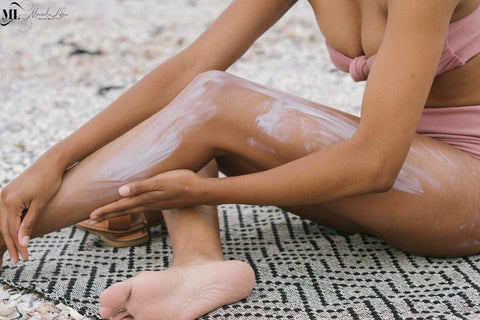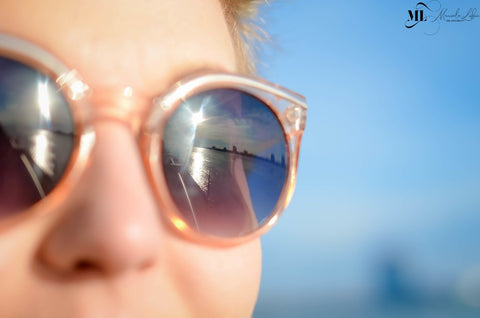While the sun is out in full force in the summer, the winter sun is much milder, but it doesn’t hesitate to take its toll on your skin. There’s a chance that you’re constantly bothered by wearing sunscreen every time you go out, especially in the summer. Well, you definitely experienced it for good reason.
Sun exposure is no joke on your skin. The sun’s harmful UV rays damage your skin in more ways than you can imagine, with most damage being irreversible. Remember one thing – using sunscreen now will help you in the future!
Without further ado, let’s take a look at why it’s important to protect our skin from the sun.
1. To avoid sunburn
The majority of people get a sunburn at some point in their lives. Excessive exposure to the sun for long hours can cause your skin to begin to damage, causing redness and weakening of the texture. Once the initial phase of sunburn has passed, your skin will even begin to swell and peel. Sunburns can be quite irritating and can last for weeks. Additionally, if you’re not careful, sunburns can also lead to painful blisters that can lead to skin cancer. Avoiding sunburn is one of the main reasons to wear sunscreen, hats and avoid the hot sun all summer long.
To protect your skin from the harmful summer sun, you should constantly apply sunscreen once every three hours in case you plan to be outside all day. This is especially critical if you plan to be out past 10:00 AM. to 2:00 p.m. when the sun is at its peak. You may also need to apply waterproof sunscreen in case you plan to swim. Although it may seem like you are being overly cautious, your skin will thank you very much!
2. To prevent skin cancer
Millions of people around the world are diagnosed with cancer every year, with skin cancer being one of the most common variants of the disease. UV radiation from the sun reaching your skin is the main cause of skin cancer. Your best chance to reduce your chances of getting skin cancer is to protect your skin from the sun by wearing sunscreen. You should apply sunscreen to all exposed parts of your body, especially your face, hands, neck and legs.

While it’s important to wear sunscreen during the summer, it’s just as important for you to wear it year-round, including winter. Although the sun may not be very visible in the winter, the sun’s rays are still reflected off the snow. If you stay outside for long periods of time, you can get sunburn which can lead to cancer overtime. Therefore, those who must be outside all day should use a sunscreen with an SPF of at least 30 to protect their skin.
3. To prevent premature aging
Excessive sun exposure causes UV rays to penetrate deep into your skin leading to premature aging. Ultraviolet (UV) rays from the sun can cause significant damage to the skin, accelerating the aging process. Prolonged exposure to UV rays leads to the breakdown of collagen and elastin fibers, which are essential for maintaining skin elasticity and firmness. This breakdown results in the formation of fine lines, wrinkles and sagging skin, characteristic signs of premature aging. In addition, UV exposure can cause uneven skin tone and hyperpigmentation, such as age spots and freckles, contributing to a larger appearance.
Signs of aging such as wrinkles, loose skin, fine lines, etc. it can be very obvious on your face. Although there are many effective treatments such as using the best natural moisturizer for aging skin or an antiaging vitamin C serum that can help reverse the signs of aging, many people choose to avoid them in the first place.
Those who wear sunscreen are less likely to show signs of aging at a younger age. The problem is that UV rays damage the elastin and collagen in your skin which causes it to age. Remember that the best facial for aging skin consists of a good Vit C serum, an anti-aging retinol moisturizer and of course – sunscreen!

4. To eliminate dark spots and hyperpigmentation
Sunburn is a rather temporary condition. it makes the skin red for a while and clears up in a week or two. However, it often leaves some skin problems behind. Dark spots and hyperpigmentation are two such skin conditions that occur as a result of tissue damage due to harmful UV rays. These problems are especially concerning if your skin is already damaged. While applying a sunscreen with at least SPF 30 is a great way to prevent sun spots and hyperpigmentation, unfortunately if you end up suffering from either of these conditions, natural anti-aging skin care such as an anti-aging vitamin C, can work wonders. to rejuvenate your skin and reduce hyperpigmentation.
These spots, commonly known as age spots or sun spots, are especially prevalent in areas that are frequently exposed to the sun, such as the face, hands, and arms. Persistent sun exposure without adequate protection can not only cause new hyperpigmented areas to develop, but can also darken existing ones, making them more intense and harder to treat.
5. To prevent tanned skin
The majority of people long for a nice summer tan. However, the fact is that tanned skin is an indicator of injured skin. The reason this happens is that your body builds a protective mechanism to defend itself against UV radiation. This allows your body to then begin to repair the skin, bringing your skin back to fairness. However, this process is not good for you as too much tanning can lead to sunburn. If you choose to lay in the sun for some warmth, it’s best to lather your body with sunscreen or moisturizer that contains SPF.
Beyond cosmetic considerations, UV exposure increases the risk of skin cancers, including melanoma. Therefore, daily application of a broad-spectrum sunscreen with a high SPF, wearing protective clothing and seeking shade during peak sun hours are essential steps to maintaining youthful, healthy skin and protecting it from the harmful effects of the sun. . This preventative approach not only helps maintain youthful-looking skin, but is also vital for overall skin health and cancer prevention.

6. To protect pre-existing skin conditions
In case you have a pre-existing skin condition that you are not very happy with, then there is no need to add to your worries by over-exposing your skin to the sun. For example, some people suffer from varicose veins that tend to form in the legs. When left in the sun for too long, sunlight can further damage these blood vessels by breaking down the collagen in the skin.
Sun damage also worsens skin texture, making it rough and leathery. By regularly using broad-spectrum sunscreens, wearing protective clothing, and seeking shade, especially during peak sunlight hours, you can greatly reduce these risks. Cosmetic concerns aside, sun protection is vital to reducing the risk of skin cancer, making it an integral part of any skin care regimen. Therefore, diligent sun protection is more than just a cosmetic consideration. is a vital health practice for maintaining youthful, healthy skin and overall well-being.
7. Promote Better Overall Skin Health
Protecting your skin from the sun promotes better overall skin health. Not only does it reduce the risk of skin cancer or other diseases, but it keeps you young. Simply by applying sunscreen or a moisturizer with SPF, you can save your skin from a myriad of ailments and skin problems, including dark spots and hyperpigmentation.
Premature aging and hyperpigmentation are probably the biggest problems most women face when it comes to sun exposure. However, you don’t need to worry too much about them!
Signs of aging can be reversed by incorporating retinol into your daily skincare routine. A retinol moisturizer can help reduce wrinkles and fine lines, making your skin look brighter, younger and more rejuvenated. Check out ML Delicate Beauty’s 0.5% Retinol Moisturizer now!

Sun exposure can really diminish your skin and the appearance of dark spots and pigmentation only makes it worse. But the good news is that you can revive your skin’s lost charm by using an all-natural vitamin C serum. Vitamin C is an antioxidant that can be extremely hydrating for your skin, restoring its natural freshness! Check out ML Delicate Beauty’s Anti-Aging Vitamin C Serum!
Don’t forget to drink plenty of water and apply a good sunscreen with a minimum of SPF 30 before leaving your home. Also, if you don’t want to apply sunscreen, it’s best to choose a good natural moisturizer that contains SPF.
RELEVANT ARTICLES:
- Why is ferulic acid a cult-favorite ingredient in skin care?
- How to prevent acne: 8 effective tips to avoid breakouts
- 9 Common Skincare Mistakes That Are Harming Your Skin
- 6 Benefits of using facial serums
About the author:
Jennifer Valdino is a Facial and Skin Care Specialist. She often shares her holistic approach to taking care of your skin through many public speaking engagements. Jennifer truly understands how self-defeating it can be to have bad skin and is passionate about sharing her knowledge on how to deal with it. She knows firsthand how skin is so inextricably linked to self-confidence, as well as the best science-backed method to handle it.
Follow her Twitter and Instagram

